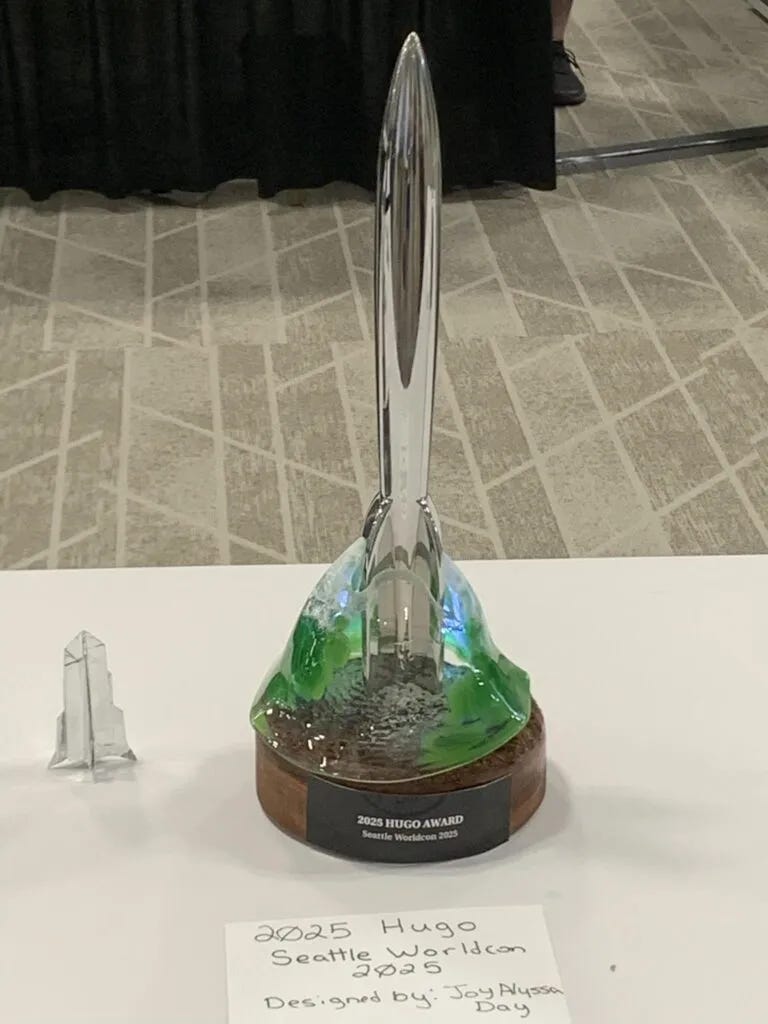Progress and Visions of the Future
What can AI do? Or is that even the right question? What did people think looking forward from the past?
At Worldcon this year, there was a panel on “Underrepresented Occupations of the Future”. The authors on the panel were speculating about surprising or unexpected jobs which humans will be doing in the future. Even though they were frequently thinking from the angle of being authors, they weren’t primarily talking about story ideas - they were trying to predict how the future would plausibly turn out.
Unsurprisingly, one of the major questions batted back and forth was AI. What jobs will AI take? Or, what jobs will AI’s not take, or create - what will humans still be doing? A number of the panelists speculated about what AI’s will never be able to do. But, Ada Palmer asked another question: Even if AI’s can do just about any job, what will we continue to want humans to do?
Behind these questions lies a difference in thinking about history, and a difference of imagination in writing.
Someone might object to how Palmer was behaving on the panel, how she kept contradicting her fellow panelists and switching the subject away from things AI supposedly couldn’t do. I saw on the Worldcon Discord server one criticism of an unnamed panelist, which might’ve been vagueblogging her here.
But - I agree with Palmer. I don’t know how I could’ve done better there. On the facts, she’s absolutely right. For half the examples the panelists gave of “jobs an AI would never be able to do,” I could think of a vague idea of how to get an LLM to do them! LLM-controlled robots should be able to pick fragile fruit based on feedback from their sensors, LLM’s should be able to judge people’s emotional state from their tone and facial expressions, and LLM’s should be able to judge how to proceed with surgery upon encountering bioabnormalities.
Of course, a vague idea isn’t a clear training plan, but I’m sure there isn’t any fundamental barrier there. The other panelists claimed there was a fundamental barrier, but they barely tried to defend that. As Palmer says, LLM’s have surmounted many barriers we thought existed in the past. I believe there are fundamental barriers elsewhere - but, based on what I know about LLM’s, there aren’t at any of the points the panelists were talking about here.
Yet, I don’t mean to write just about AI. There’re more than enough pieces out there about how AI will, or won’t, take our jobs now or next decade or next century.
On a more fundamental level, the point is that - regardless of exactly what AI’s do - the future is going to be different from the present. What’s more, it’s going to be very different from what a lot of people expect. That’s still the case regardless of which particular group of people - if any - is most correct.
From a historical perspective, this shouldn’t surprise us. As Palmer pointed out on another Worldcon panel, for a while, people didn’t even think of the idea that history will fundamentally progress. Even into the Renaissance, nobody contemplated a fundamental change to the “Wheel of Fortune” where societies rose and declined to more or less the same heights again and again. The most people hoped for was to equal the heights of the fabled ancient Golden Age (whether of Charlemagne, the Roman Empire, the Heroic Age, or some other real or fictional epoch).
Even after that point, we get forecasters having no idea of what the future might be. Take how Thomas Jefferson was convinced that North America would have “room enough for our descendants to the hundredth and thousandth generation”. Or more specifically, take Oman’s 1763 novel The Reign of George VI, set in a fictional 1900’s, describing an invasion of Britain using the same technology and sort of warfare of the 1700’s.
Based on how things had changed up to their day, Oman and Jefferson were both quite correct. Despite the change from swords to guns, war was still fought by individual men taking territory; despite the growth of the Thirteen Colonies, it had still taken over a century for settlement to start to pass the Appalachians. Yet, things were about to change.
This’s frequently cited by people talking about a future technological singularity: Even the most up-to-date learned man of the 1700’s had utterly no idea what the 1900’s would be like. The change of the Industrial Revolution outpaced all forecasts. It wasn’t just the technology that changed so fast, though it did; it was the impact of the technology throughout life.
There’s a saying that a good science fiction writer predicts the automobile; a great one predicts the traffic jam. That’s because the second-order effects of a technology are so hard to predict.
I read an excellent book a few years ago which dug into history to try to piece together all the consequences that came from British people starting to use coal instead of wood in their fireplaces. They were astonishingly broad, ranging from cooking roasts and stews instead of pottage (because coal heat spread differently through cooking-pots), to women being expected to focus their energy on cleaning the house (because coal smoke was more messy and harder to clean), to so many more. That was just one technology. It was hard enough, I’m sure, piecing it together after the fact; who could possibly have foreseen half of it?
And, no one did see the effects of so many technologies. Look at all the Golden-Age science fiction writers who even included computers in their stories, but still had human pilots piloting spacecraft by feel, or (sometimes) engineers drafting with physical slide rules. In the real world, NASA seriously considered having the Apollo rockets piloted solely by computer.
Sometimes, I’m sure, they weren’t trying to seriously predict things. In that way, the Worldcon panel - which was billed as serious prediction attempts for potential futures - should have an advantage. But still, when we read science fiction authors of the past, we end up reading them in part as predictions and thinking over what they got right or wrong.
But beyond technological changes, consider social changes.
Golden Age science fiction is frequently criticized for importing its own contemporary gender and social norms into the future. Most of it does, indeed, do that. But gender norms - and all sorts of social norms - look surprisingly robust to someone living under them, especially someone who believes in them.
Some years ago, I was at a book club discussing A Mote in God’s Eye, which contains a space empire governed by an absolute emperor and a formal aristocratic social structure, together with (of course) 1970’s gender norms. Most of the other people in the book club objected disdainfully that humanity would never return to monarchy or aristocracy or older gender norms. I was perhaps the only person who pointed out that it is possible; if something’s changed once it might change again.
Some years before then, I was reading the (excellent) Enchantress from the Stars by Sylvia Louise Engdahl, first published in 1970, where it’s a maxim of societal development that every species gets interstellar flight and space empires before they realize colonialism is bad. In her much-later afterword, Engdahl explains that she believed at the time that was correct, but she’s since been surprised by how societal moral standards have changed so much faster than spaceships.
Or, beyond changes in social mores, consider social movements. So many predictions during the Cold War missed the fall of the Soviet Union; so many predictions from World War II and earlier missed decolonization; so many predictions from the Victorian Age missed the World Wars.
David Friedman once asked the Society for Creative Anachronisms (in passing) to imagine a world where we had no idea what medieval people actually ate. In that world, he said, medieval-recreation events should at least serve something different from normal American food so as to “at least help create the feeling that we are no longer in our normal Twentieth Century world”.
While we do know a lot about the historical Middle Ages, we don’t know anything about the future. Prognosticators - whether science fiction writers or otherwise - are actually in that hypothetical. As Friedman says, the one thing we can say is that things will probably be different.
Of course, not everything will be different! Oman was wrong in describing war, but he was right that the early 1900’s would see a king reigning over Britain and wars being fought in his name. A hypothetical prognosticator from a thousand years ago would have no idea about most of modern life, but he’d still see Christianity a thousand years later.
But, much will. Oman was right to predict a king of England - but he would’ve been wrong about France or Portugal. We’re in much more danger of assuming the future will be too much like the present, or like specific models of the future that’re in vogue. When predicting the future, we need to exercise intellectual humility - but when making specific predictions, it’s best to let our imagination run wild in myriads of different directions to question one assumption after another.





Jevons's early book The Coal Question forecast the exhaustion of all of Great Britain's coal reserves and the end of its industrial economy. He actually mentioned solar power, but thought that while it could work in the American southwest it would never do for the British Isles to rely on it.
My favorite prognostication about future food was a science fiction novel where the "health food" movement insisted on eating only food digested by bacteria and fungi, on the ground that natural plant tissues were full of naturally evolved toxins. I forget which novelist wrote that. Maybe Stephenson?
I have been haunted for the past year or two by the vision of a future that looks back in horror on the reckless use of synthetic pharmaceuticals in the twentieth and twenty-first centuries, and makes almost no use of things from oral contraceptives to psychological medications to RNA vaccines, regarding such things the way we regard Victorian use of tartar emetic and calomel and the like.
Reminds me of trope of scifis still have drug laws/cops etc "Outlander" "Minority Report" first come to mind. They can imagine any future except the end of prohibition.